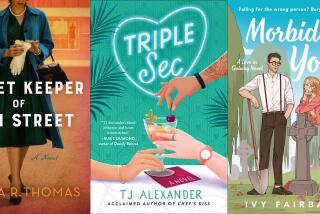The recession -- isn’t it romantic?
- Share via
Amid the ceaseless reminders that the economy is in a persistent vegetative state, it’s easy to forget that some industries and products are thriving. U.S. News & World Report, which recently released its list of “10 Winners in the Recession,” says that Hershey’s chocolate increased earnings by more than 50% last quarter and the Burpee seed company has said it expects sales to increase by 25% in 2009 (and this was before the first lady’s organic-gardening initiative).
McDonald’s same-store sales were up 6.8% last month (thanks, no doubt, to value meal menus that can provide an entire day’s worth of calories for a few dollars). Career development websites saw their traffic jump 20% from last year to this year, and resume editors are apparently doing a brisk business, especially when it comes to the healthcare, tourism and restaurant industries (finance, not so much).
But the most intriguing entry was the third item on U.S. News’ list: bodice-ripper novels. Harlequin, still the biggest name in serial romances, saw a $3-million gain, year to year, in North American sales in the fourth quarter of 2008 (by contrast, book sales in the general marketplace are down slightly).
It’s so easy to poke fun at contemporary romance novels that there’s really no sport in it. The plots, by definition, are formulaic; the prose manages to be at once overwrought and underdeveloped; the covers, well, they’re where that famous, flaxen-haired slab of manhood named Fabio got his start. But romances have long dominated sales of mass-market paperbacks (which, in turn, dominate sales of books in general). According to statistics from Romance Writers of America, an organization of more than 10,000 published and aspiring novelists, romances generated $1.375 billion in sales in 2007. It’s even been said (granted, by a Harlequin author) that, worldwide, someone buys a Harlequin book every four seconds.
It’s not exactly a surprise that the romance novel business would be pretty recession-proof; as bad as things get, a lot of people -- OK, mostly women -- can still afford a $5 paperback. It’s also no great mystery why stories of women being wooed by chiseled, robust millionaires would be extra appealing in an era when a lot of millionaires are finding themselves downgraded to (if I may dust off a favorite word from my childhood) “thousandaires.”
But, in parsing the titles listed on Harlequin’s website, it struck me that the real reason serial romances are thriving in a desiccated economy is not just because they’re the ultimate escape fantasies but because, in their own way, they are that Holy Grail of marketing and business -- they offer something for everyone.
Among Harlequin’s 10 imprints are dozens of categories and sub-categories, including medical romance, Christian romance, paranormal romance, suspense romance and even NASCAR romance (titles include “Checkered Past” and “Black Flag, White Lies”). Unexpected pregnancy scenarios are popular across categories (“Forced Wife, Royal Love Child,” “The Heart Surgeon’s Baby Surprise”), as are single-mother situations (“The Aristocrat and the Single Mom”). I even saw one book about an unwed pregnant woman courted by a man who isn’t the father of her baby but wants to be. He also happens to be super hot.
See, you forgot about the economy for a second there, didn’t you?
If there’s anyone who’s predisposed to being snobby about this genre, it’s me. I wouldn’t buy a romance novel unless it was specific enough to my own escape fantasies to be called something like “Ralph Fiennes, Personal Assistant and Discreet Ghostwriter of Newspaper Columns.” But even I can understand the impulse: Isn’t “the quest for true love” really just code for something else, namely the search for a sense of safety -- financial and otherwise -- in a precarious world?
In most of these novels, the heroine is in a position of not really being able to trust the intentions of her love (or lust) object. And although she desperately wants a happily-ever-after with a cardiologist/secretly wealthy ranch hand/oil tycoon/Ralph Fiennes, she can’t shake her fear that she’s being lied to. And yet she also can’t allow herself to believe that her spicy encounters are anything more than a house of cards that will eventually leave her destitute and alone.
You don’t have to like romance novels -- or even cardiologists or ranch hands -- to know what that kind of uncertainty feels like. All you have to do is follow the financial news. In fact, given that many Americans are feeling as distrustful of the bank bailout and the economic stimulus package as Harlequin heroines feel about their suitors, maybe the term “escape fantasy” is a misnomer. Maybe these books are recession-proof not because they offer an alternative to uncertainty but because they reflect it back at us -- with a lot of sex thrown in (and a happy ending).
Oh, and No. 4 on U.S. News & World Report’s recession winners list? Condoms. Maybe Harlequin should ease up on those unexpected-pregnancy fantasies.
--
More to Read
Sign up for our Book Club newsletter
Get the latest news, events and more from the Los Angeles Times Book Club, and help us get L.A. reading and talking.
You may occasionally receive promotional content from the Los Angeles Times.









